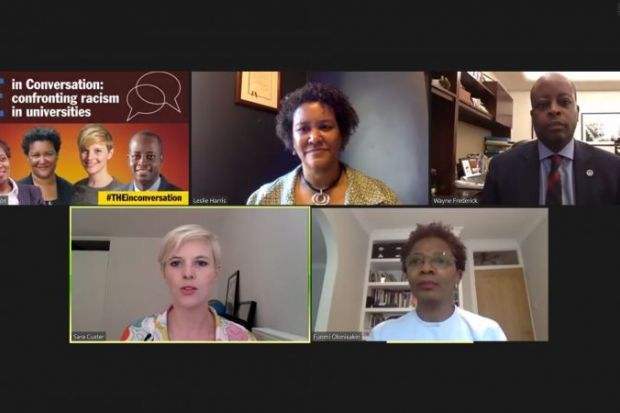Universities need to strategise on equality and diversity as seriously as they would for boosting their league table rankings or accessing funding, leading academics have said.
“We have to rethink what we think of when we think of great universities,” Leslie M. Harris, professor of history at Northwestern University, told an online forum held on 19 June by Times Higher Education.
The anti-racism protests that have swept the world in recent weeks are “yet another moment when we have the opportunity for change; we have to continue to think creatively [about] how we can create more equitable universities”, she said.
Issues of race deserve as much strategic thinking and planning as universities devote to efforts to gaining a place in a top 10 list or winning funding, Professor Harris said. However, she continued: “I can’t think of an institution that has planned strategically around issues of diversity to the extent that they plan around these other things.
“Universities want to set up one vice-provost for diversity or a chief diversity officer without building the infrastructure or the learning opportunities that we all need to address this problem.”
Professor Harris said she believed that most people in universities were genuine about wanting change, but amid “the rush of the publish-or-perish of everyday university life, it’s very easy for institutions to not give staff enough time to deal with those issues”.
Improving diversity and equality in academia would require a “carrot and stick” approach, she said.
For example, departments should be encouraged to retool and rethink their pedagogies when it comes to decolonisation. “We do this all the time. We did it when we all switched to teaching via Zoom, but we rarely commit…strategic planning to these kinds of programmes,” she said.
Wayne Frederick, president of Howard University, the US’ most prominent historically black university, agreed. “Systemic racism exists. If that truth is told nowhere else, it has to be told in our universities,” he said. “You have to invest in the communities where you have de-invested for so long. That’s the most uncomfortable conversation we have to have.”
‘Funmi Olonisakin, vice-president and vice-principal (international) and chair of the Race Equality Leadership and Action Group at King’s College London, said: “We need to be able to look at every university from now on and see a programme and a commitment [to diversity and decolonisation].”
UK universities needed “a national framework to hold ourselves to account”, she said, even though she admitted that universities often bristled at government direction when it came to curricula and assessment.
The real transformation “will come from the bottom up”, Professor Olonisakin said. “Without acknowledging the historical injustices, as well as the recent patterns of injustice, we cannot convince our communities that we can be responsible to make change happen.”
Removing statues dedicated to colonialists or slave owners was only a starting point, she said. “It is not enough” in itself, she emphasised.
“You want to build an environment where every member of staff and student feels a sense of belonging − that is at the heart of what you do with the curriculum; it’s at the heart of the institutional culture of our universities, and there is a long way to go,” Professor Olonisakin said.
Decolonising the curriculum seems to be political, but it should be seen as a question of power, she added. “What I hope will happen in King’s College London is we will teach cultural competency at the point of entry, so every student or staff who arrives here will encounter the ability to see the world through the eyes of the other. That changes everything.”
anna.mckie@timeshighereducation.com
Watch the full panel discussion
Register to continue
Why register?
- Registration is free and only takes a moment
- Once registered, you can read 3 articles a month
- Sign up for our newsletter
Subscribe
Or subscribe for unlimited access to:
- Unlimited access to news, views, insights & reviews
- Digital editions
- Digital access to THE’s university and college rankings analysis
Already registered or a current subscriber? Login








